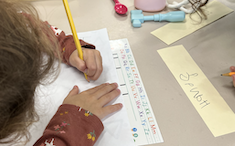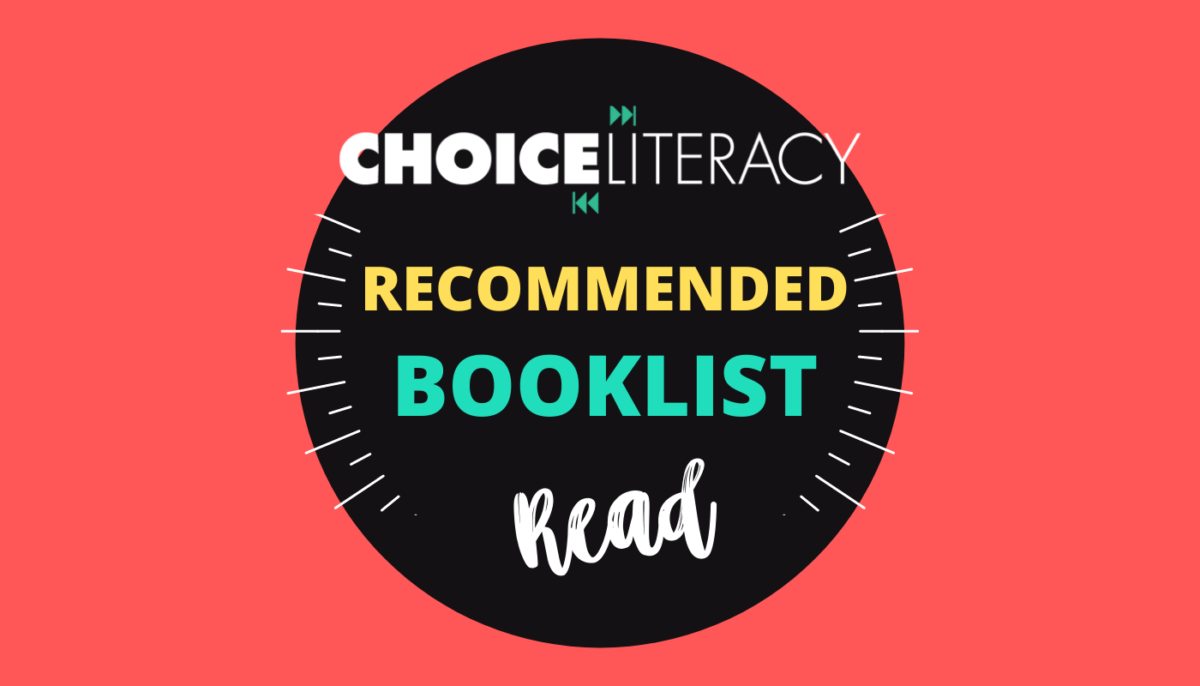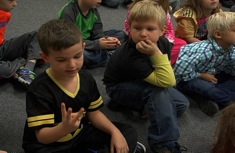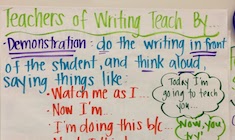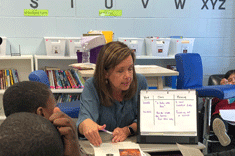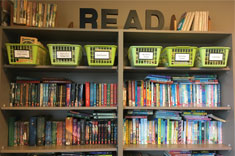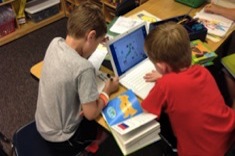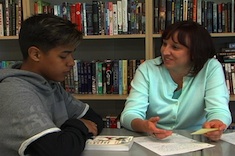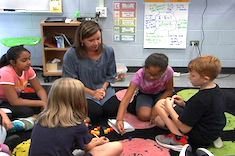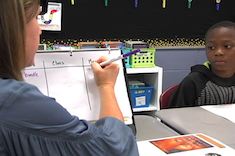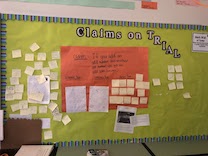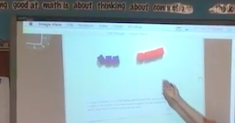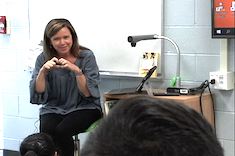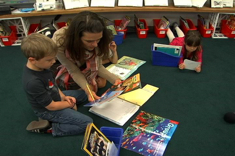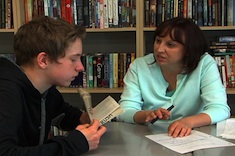6th
Latest Content
QuickTake: Choice in Making Plans for Writing
Ruth Ayres shares the importance of giving students choice when planning their writing projects.
Writing from the Heart
Kate Mills and Tara Barnett pour their hearts into teaching writers, but when Tara loses her family dog, she is reminded that writing is the thing that helps us understand what’s most important.
Centering Students’ Brilliance (Booklist)
Stella Villalba is passionate about centering the beauty, brilliance, and genius of all students in our classrooms. She shares an inclusive booklist to inspire and support other educators in doing the same.
Student-Generated Questions to Promote Problem Solving and Modeling with Mathematics
Mallory Messenger shares a process for students to engage and solve a type of intriguing question called Fermi Questions.
Three Ways Student Writers Taught Me How to Use Writing Partnerships
Patty McGee pays attention to how students work as writers to find the teaching points for how to learn to work as writing partners.
Teaching Students to Be Teachers
Tara Barnett and Kate Mills share a process for empowering students to be teachers in partnerships and small-group instruction.
Level Two Unlocked: Using the Language of Video Games to Engage Students in the Assessment Experience
Heather Fisher considers the research behind gamified experiences and applies it to a lengthy first-grade phonics assessment. Heather challenges us to gamify assessments to maintain the integrity of the assessment while increasing student engagement.
Moving Beyond Asking Questions
Dana Murphy comes to a lesson about asking questions in a curriculum resource and realizes it is not what her students need. She has designed a lesson to make asking questions more meaningful and useful for her students.
Building Independence in Problem Solving
Mallory Messenger shares the intentional moves needed to help students build independence in problem solving.
Exploring Rural Literature—A Middle-Grade Booklist
Leigh Anne Eck was named the Indiana Rural Teacher of the Year and shares the way she rethought her library through the lens of reflecting her students’ rural identity or revealing rural stereotypes. This middle-grade booklist is an excellent place for us all to begin expanding our classroom libraries.
Assessment in Classroom Book Clubs
In this third installment about classroom book clubs, Leigh Anne Eck shares options for robust assessment as well as answers to some frequently asked questions.
Letting Informational Mentors Lead the Way
Tara Barnett and Kate Mills share a practical process for using an informational mentor text to support students as readers and writers. Download a note sheet to support students in noticing text structure.
One-Page Reading Response: A Simple Approach to Complex Assessment
Christy Rush-Levine uses one-page reading responses as a simple culminating activity to provide closure for book clubs. However, the data they offer about readers is far from simple.
Identifying Story Elements
Dana Murphy shares a whole-class conversation about identifying the climax of the plot. She reminds us that defining story elements is not always clear-cut.
Implementing Classroom Book Clubs (Part Two)
In this second installment about book clubs, Leigh Anne Eck shares procedures for book club meetings, as well as discusses the importance of standards and instruction. Download a discussion guide.
Getting Started with Classroom Book Clubs (Part 1)
In the first installment of a three-part series, Leigh Anne Eck clearly lays out how to get started with book clubs. Included is an editable planning bookmark to give students more ownership of their reading schedules.
Anthologies to Diversify Middle School Reading Instruction
Christy Rush-Levine offers a booklist of anthologies to diversify middle school reading instruction. In this robust list, everyone will find a new addition to use as a whole-class text.
Still Thinking: An Opportunity to Pause and Think Deeply
Jodie Bailey provides a structure to give students more time to think through ideas and problems. By using this practice, students gain ownership of their learning.
The Power of an Anchor Chart in a Digital World
Dana Murphy reminds us of the power of an anchor chart in a digital world.
Listening for Conjectures
Mallory Messenger shares a routine for hearing student conjectures (in math and other subjects) and a process for giving time for the class to prove or disprove the claims. Download a Conjecture—Prove or Disprove Recording Sheet to collect student conjectures in your classroom.
Student Voices First
David Pittman offers practical ways to place student voices first in classrooms in order for their passions, interests, and identities to influence our teaching.
Feedback Through Conversations: An Asset-Based Approach
Jodie Bailey focuses on the importance of an asset-based lens when conferring with her students in math—and all content areas.
Renewing Energy in the Classroom
Gretchen Schroeder finds ways to increase students’ energy for doing work in her classroom. Her practical tips are useful for all students.
Math Debates: A Powerful Sense-Making Routine
Jodie Bailey shares a powerful practice of math debates for students to explore a problem with discussion and evidence to discover the correct solution.
Nourish a Sense of Belonging
Dana Murphy shares ways to nourish a sense of belonging in all students.
Knowing Genres
Mandy Robek reflects on the importance of knowing genres and empowering students to be part of the organization process of the classroom library.
Reading Threads
Christy Rush-Levine guides us to make reading recommendations based on what students enjoy most about a book they recently read. Christy used to make recommendations based on the genre or topic, but she has learned to listen to students to discover the reason they loved a recent read and use this information for recommendations.
Holidays: Where Do They Fit in the Classroom?
Bitsy Parks shares the inspiration and practical ways she celebrates and honors holidays from many cultures in her classroom.
What Matters More
Dana Murphy shares that by asking “What matters most?” she can make decisions that allow her literacy instruction to be student-centered and authentic.
Using Daily Attendance Questions to Build Community and Communication Skills
Gretchen Schroeder is surprised to find benefits of a stronger community and communication skills through a practical attendance routine in her high school classroom.
Browse Content By
Type
Category
- Assessment Tools
- Big Fresh Archives
- Booklists
- Choice Numeracy
- Classroom Design
- Common Core
- Community Building
- Conferring
- Content Literacy
- Digital Literacy
- English Language Learners
- Equity
- Family Relations
- Free Samples
- Guiding Groups
- Leadership
- Literacy Coaches
- Mentor Texts
- Minilessons
- New Teacher Mentors
- Podcasts
- Poetry
- Quote Collections
- Reading Strategies
- Self Care
- Struggling and Striving Learners
- Talking and Listening
- Teacher Study Groups
- Teaching Reading
- Teaching Writing
- Word Study and Vocabulary
Author
- Melissa Quimby
- Nawal Qarooni
- Gwen Blumberg
- Julie Cox
- The Lead Learners
- Hannah Tills
- Josie Stewart
- Ruth Metcalfe
- Mallory Messenger
- Becca Burk
- Jodie Bailey
- Vivian Chen
- Mary Brower
- Tiffany Abbott Fuller
- Stephanie Affinito
- Ruth Ayres
- Leigh Anne Eck
- Heather Fisher
- Shari Frost
- Julie Johnson
- Suzy Kaback
- Gigi McAllister
- Shirl McPhillips
- Melanie Meehan
- Cathy Mere
- Debbie Miller
- Tara Barnett and Kate Mills
- Tammy Mulligan
- Dana Murphy
- Bitsy Parks
- David Pittman
- Brenda Power
- Heather Rader
- Matt Renwick
- Mandy Robek
- Christy Rush-Levine
- Gretchen Schroeder
- Jen Schwanke
- Brian Sepe
- Katherine Sokolowski
- Stella Villalba
- Jennifer Vincent
Grade Level
Choice Literacy Membership
Articles
Get full access to all Choice Literacy article content
Videos
Get full access to all Choice Literacy video content
Courses
Access Choice Literacy course curriculum and training

